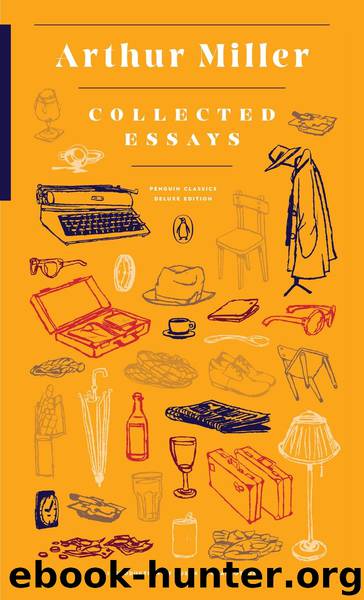Collected Essays by Arthur Miller

Author:Arthur Miller
Language: eng
Format: epub
Publisher: Penguin Publishing Group
Published: 2016-10-21T11:38:51+00:00
A VIEW FROM THE BRIDGE
Introduction to A View from the Bridge
(TWO-ACT VERSION)
1960
A play is rarely given a second chance. Unlike a novel, which may be received initially with less than enthusiasm, and then as time goes by hailed by a large public, a play usually makes its mark right off or it vanishes into oblivion. Two of mine, The Crucible and A View from the Bridge, failed to find large audiences with their original Broadway productions. Both were regarded as rather cold plays at first. However, after a couple of years The Crucible was produced again Off-Broadway and ran two years, without a line being changed from the original. With McCarthy dead it was once again possible to feel warmly toward the play, whereas during his time of power it was suspected of being a special plea, a concoction and unaesthetic. On its second time around its humanity emerged and it could be enjoyed as drama.
At this writing I have not yet permitted a second New York production of A View from the Bridge principally because I have not had the desire to see it through the mill a second time. However, a year or so after its first production it was done with great success in London and then in Paris, where it ran two years. It is done everywhere in this country without any apparent difficulty in reaching the emotions of the audience. This play, however, unlike The Crucible, I have revised, and it was the revision which London and Paris saw. The nature of the revisions bears directly upon the questions of form and style which interest students and theater workers.
The original play produced on Broadway (Viking, 1955) was in one act. It was a hard, telegraphic, unadorned drama. Nothing was permitted which did not advance the progress of Eddie’s catastrophe in a most direct way. In a Note to the published play, I wrote:
What struck me first about this tale when I heard it one night in my neighborhood was how directly, with what breathtaking simplicity, it did evolve. It seemed to me, finally, that its very bareness, its absolutely unswerving path, its exposed skeleton, so to speak, was its wisdom and even its charm and must not be tampered with. . . . These qualities of the events themselves, their texture, seemed to me more psychologically telling than a conventional investigation in width which would necessarily relax that clear, clean line of his catastrophe.
The explanation for this point of view lies in great part in the atmosphere of the time in which the play was written. It seemed to me then that the theater was retreating into an area of psycho-sexual romanticism, and this at the very moment when great events both at home and abroad cried out for recognition and analytic inspection. In a word, I was tired of mere sympathy in the theater. The spectacle of still another misunderstood victim left me impatient. The tender emotions, I felt, were being overworked. I wanted to write in a way that would call up the faculties of knowing as well as feeling.
Download
This site does not store any files on its server. We only index and link to content provided by other sites. Please contact the content providers to delete copyright contents if any and email us, we'll remove relevant links or contents immediately.
4 3 2 1: A Novel by Paul Auster(11032)
The handmaid's tale by Margaret Atwood(6836)
Giovanni's Room by James Baldwin(5870)
Big Magic: Creative Living Beyond Fear by Elizabeth Gilbert(4716)
Asking the Right Questions: A Guide to Critical Thinking by M. Neil Browne & Stuart M. Keeley(4563)
On Writing A Memoir of the Craft by Stephen King(4204)
Ego Is the Enemy by Ryan Holiday(3982)
Ken Follett - World without end by Ken Follett(3968)
The Body: A Guide for Occupants by Bill Bryson(3788)
Bluets by Maggie Nelson(3704)
Adulting by Kelly Williams Brown(3662)
Guilty Pleasures by Laurell K Hamilton(3578)
Eat That Frog! by Brian Tracy(3505)
White Noise - A Novel by Don DeLillo(3429)
The Poetry of Pablo Neruda by Pablo Neruda(3358)
Alive: The Story of the Andes Survivors by Piers Paul Read(3300)
The Bookshop by Penelope Fitzgerald(3220)
The Book of Joy by Dalai Lama(3212)
Fingerprints of the Gods by Graham Hancock(3206)
